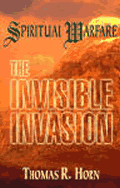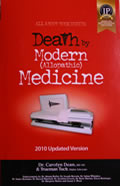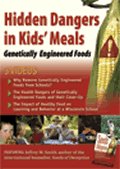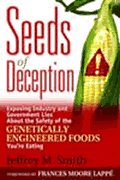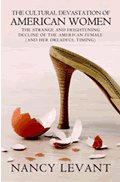Other
Horn
Articles:
Is God Trying To Talk To Somebody In America?
Giving Power to the Image of the Beast
Are Christians Being Groomed to Accept The Coming Antichrist?
By Thomas R. Horn
February
25, 2007
NewsWithViews.com
Two weeks ago a writer for Wired Magazine, Elizabeth Svoboda contacted me to let me know she was writing an article "about research advances using transgenic animals to produce pharmaceutical compounds." She had come across an editorial by me raising caution about this kind of experimentation, and wondered if I might be willing to provide points for her article, elaborating areas where I saw producing transgenic animals as potentially harmful. She stated that most of the scientists she planned to quote were "pretty gung-ho about the practice," and thought it would be important to provide some balance. I thanked her for the invitation, and sent a short summary of some, though not all, of the areas where concerns about this science could be raised.
When the article was published by Wired last week, I was surprised that none of my notes had made it into the story. When I contacted Elizabeth and asked why, she said, "Unfortunately, my editors cut your quotes (originally included in "Pharm Animals Crank Out Drugs") during the editing process." She apologized and said she hoped the experience had not soured me on dealing with Wired Magazine.
"It doesn't sour me," I assured her. "I just think the reporting by most agencies is lopsided and missing the opportunity to thoroughly engage such an important issue."
The Wired Magazine article was mostly positive about transgenic research and concluded with scientist Marie Cecile Van de Lavoir saying that potential human health benefits from transgenic research "justify tinkering" with nature's plan. "If a transgenic animal produces a great cancer therapy," she said, "I won't hear anyone saying, 'You shouldn't do that.'"
The shortsightedness of Van de Lavoir's comment was as scary as the science in my opinion, and in case anybody is interested, below is the short list -- by no means a complete list -- of areas where I suggested ethical issues could be raised about transgenic and related science and which need to be addressed for any balanced treatment of the field:
NUMBER ONE: What will the long term impact on the environment and health-related issues be? As we have seen with genetically modified crops, unpredictable things can occur when living organisms are modified in unnatural ways. Transgenics is one of the fields in biotechnology where the DNA of one species is blended with the DNA of a different species, thus crossing the species barrier, something that neither creation nor evolution allowed for. In the past I have cited laboratory results reported by Dr. Arpad Pustai and repeat verified by Irina Ermakova that showed GM food had surprisingly ill effects on the health of test rats, including organ deterioration, shortened life span and cancer development. The independent experiments led to the biotech industry suppressing the findings and an 8-year court battle with biotech corporations, who did not want the results made public. Just last week the suppressed report was in the news again as Greenpeace activists published evidence from the Russian trials verifying the ramifications of the negative health issues related to transgenic foods. Additional research on the significant health dangers represented by GM foods are archived at SeedsOfDeception.
NUMBER TWO: Transgenic research that includes inserting animal DNA into humans and human DNA into animals at the embryonic level could escape its control environment, thereby passing the altered DNA into nature. Once this happens it would be impossible to put the genie back in the bottle and could lead to hybrid viruses, prion contamination or new diseases that we neither can foresee or prepare for.
NUMBER THREE: Animal rights activists have raised questions in this area that have to do with the ethics of altering animals in ways that could be demeaning to them. For instance, creating zombie-like creatures that grow in feeder labs and gaze off into space from birth until death. Militarized animals that behave in unnatural, unpredictable ways. Humanized animals that become "self-aware," or animals that produce human sperm and eggs, which then are used in vitro fertilization to produce a human child. Who would the parents be? A pair of mice?
NUMBER FOUR: Questions are evolving now over "patenting" of transgenic seeds, animals, plants and synthetic life forms by large corporations, which threatens to impact the economy of rural workers and farmers.
NUMBER FIVE: Biotech "patenting" of human genes. Consider Michael Chrichton's piece for the New York Times last week "Gene patents aren't benign and never will be" in which he claims that people could die in the future because they might not be able to afford medical treatment as a result of medicines owned by patent holders of specific genes related to those persons. Some of these gene modifications and patents are growing out of transgenic research.
NUMBER SIX: Where biotechnology is ultimately headed in redefining what it means to be a human. I have been a guest on Dr. James Hughes Changesurfer Radio show (Hughes is the author of "Citizen Cyborg: Why Democratic Societies Must Respond to the Redesigned Human of the Future" and a professor at Trinity College) and I know that James together with other transhumanists (such as professor Nick Bostrom of Oxford University) speak eagerly of advances in human genetic modification including transgenics as the next step in human evolution, ultimately leading to post-humans.
NUMBER SEVEN: Redefining basic human rights. Dr. Hughes wants transgenic chimps and great apes uplifted genetically so that they will have basic human cognitive ability as a way of proving that certain cognition and not "human-ness" should be the key to constitutional protections and privileges. Such changes to intrinsic sanctity of human life could pave the way for such things as harvesting organs from people like Terry Schiavo, due to a loss of cognitive ability. Adopting such "personhood" theory based on specific cognitive abilities would be to deny what bioethicists like Wesley J. Smith (www.wesleyjsmith.com) champion as "human exceptionalism", the idea that human beings carry special moral status in nature and special rights, such as the right to life, plus unique responsibilities, such as stewardship of the environment. Some but not all believers in human exceptionalism base this concept on a biblical worldview: Genesis 1:26 "And God said, Let us make man in our image, after our likeness: and let them have dominion over the fish of the sea, and over the fowl of the air, and over the cattle, and over all the earth, and over every creeping thing that creepeth upon the earth." Others who do not necessarily have a biblical worldview are nonetheless concerned about the unnatural alteration of living organisms and the unknown repercussions.
NUMBER EIGHT: Transhumanist views of Biotechnology including transgenics are opening the door for a new eugenics and social Darwinism, which we already see developing in "Right to Die" laws and related issues. The whole idea of transhumanism is to use the fields of biotechnology, nanotechnology, robotics, mind-interfacing and related sciences to create a superior man. The result will lead to classifications of persons -- the enhanced and the not enhanced -- ultimately giving rise to a new eugenics.
In
conclusion, there are numerous other reasons to be cautious about
GM and transgenic fields. No doubt some positive advances could come
of genetic engineering, but the president's own former chairman for
his Council on Bioethics, Leon Kass has warned that this technology
is placing the animal and human species as well as other living organisms
on the operating table for wholesale redesign; that we are reinterpreting
what it means to be an animal, a human, a super-human or even a god.
Professor Francis Fukuyama, in his book "Our Posthuman Future: Consequences
of the Biotechnology Revolution" says this is the most dangerous field
of science in the history of man and could produce an extinction level
event for the human race, a Pandora's' box. For these reasons and
more, careful consideration should be given to the control environments
where fields of study are being made. That has not always been the
case, and given what we are seeing in open studies, it appears the
public is the guinea pig in some cases.
� 2007 Thomas R. Horn - All Rights
Reserved
Thomas Horn is the CEO of RaidersNewsNetwork.com and SurvivorMall.com.
Over the last decade, he has authored three books, wrote dozens of published editorials, and had several feature magazine articles. In addition to past articles at NewsWithViews.com , his works have been referred to by writers of the LA Times Syndicate, MSNBC, Christianity Today, Coast to Coast, World Net Daily, White House Correspondents and dozens of newsmagazines and press agencies around the globe. Tom's latest book is "The Ahriman Gate," which fictionalizes the use of biotechnology to resurrect Biblical Nephilim.
Thomas is also a well known radio personality who has guest-hosted and appeared on dozens of radio and television shows over the last 30 years, including "The 700 Club" and "Coast to Coast AM." When looking for a spokesperson to promote their film "Deceived" staring Louis Gossett Jr. and Judd Nelson, "Cloud 10 Pictures" selected Thomas as their spokesperson to explain the Christian viewpoint on UFO-related demonology.
Web Site: RaidersNewsNetwork.com
E-Mail: RaidersNewsUpdate@gmail.com
When the article was published by Wired last week, I was surprised that none of my notes had made it into the story. When I contacted Elizabeth and asked why, she said, "Unfortunately, my editors cut your quotes (originally included in "Pharm Animals Crank Out Drugs") during the editing process."


